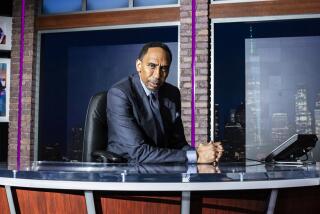A Bird’s-Eye View Opens New Vistas at Channel 7
A Rose is a Rose is a Rose.
It’s obvious now that KABC-TV Channel 7 chose wisely in hiring former California Chief Justice Rose Elizabeth Bird to succeed liberal commentator Bill Press, who left to pursue the Democratic nomination for U.S. Senate.
A good TV commentator is usually defined as a commentator who agrees with you. Bird arrives with other virtues, however.
For one thing, it’s exhilarating to see a female commentator in a field dominated by males. From Channel 7’s other full-time commentator, Bruce Herschensohn, to the people who deliver editorials at Los Angeles stations, to the reviewers of movies, local TV’s voices of authority are a male monolith. Good riddance to that.
For another thing, Bird’s commentaries have been forceful, thoughtful and eloquent, regardless of their political or philosophical shadings.
She’s not slick. She’s remains somewhat stiff and mechanical delivering her prepared pieces on TV. And she was no better in her one shot at instant analysis--a forced, stumbling, disastrously knee-jerk evaluation of President Reagan’s recent press conference--than others are at this superficial and usually worthless form of commentary. Blame the impossible format in that instance, not her.
More importantly, Bird has made significant strides in front of the camera since her failed confirmation campaign to continue her controversial tenure on the state’s highest court. Far better a relative TV novice with something to say, moreover, than a noodle-minded smoothie who merely sounds and looks good.
And Bird has plenty to say.
Although her Feb. 4 debut--a Charles Osgood-style poem deploring the internment of Japanese-Americans during World War II--drew snickers in some circles, her message was moving and important. And her comments about the Winter Olympics-fostered “obsession with winning” may have been the truest words spoken on TV during that event.
Bird delivered an impassioned lament that the Rev. Jesse Jackson may be denied the Democratic nomination for President merely because he’s black. In another inspired commentary, she suggested that when presidential candidates often refer to themselves in the third person on the stump, they are really alluding to their packaged-for-TV images.
The worldly view is welcome.
What Bird doesn’t give Channel 7--which Press did--is a direct and immediate counterpoint to Herschensohn, the station’s conservative commentator who predominantly addresses topical issues, often reacting to that day’s news. While Bird offers her version of the big picture, Herschensohn slugs it out in the partisan political trenches.
Although Bird would surely fall under the “liberal” category, Herschensohn is much more of an ideologue on the air, giving Channel 7 a decidedly conservative predominance in commentaries on political issues. That’s so even taking into account liberal John Tunney’s debates with Herschensohn on Channel 7.
The only way Channel 7 can achieve true balance is to supplement Bird with a liberal commentator who is more directly Herschensohn’s opposite number.
Meanwhile, Bird’s predecessor is back in the job market.
“I’m eager to get back into broadcasting,” said Press, who recently withdraw from the Senate race after failing to make much of an impact. Press said that his old employer made no promises about hiring him back when he left, but that “Channel 7 will be the first people I will sit down and talk to.”
Press was the latest Channel 7 news employee to run for political office, following Herschensohn and legal specialist Lisa Specht. And even though his campaign fizzled early, running out of support and money, Press maintains that his TV celebrity was invaluable.
“Absolutely,” he said. “It’s clear that unless you are an incumbent office holder or independently wealthy, about the only way to break into politics is to be in the media. You still run up against a money problem. You still need enough money to get you to Election Day. But at least it gets you on the playing field.”
The continuing question: Is it proper for the Herschensohns and Presses of TV to try using their fame as springboards to political office?
Of course it is. What’s more, it may be to the public’s advantage, because TV commentators’ views on the issues are so well known that flip-flopping for political reasons would be detected quickly.
The two-way revolving door connecting politics and the news business has been operating for years. Press’ playing field used to be Sacramento, where he worked for then-Gov. Edmund G. Brown Jr. Herschensohn once worked for President Richard Nixon. Channel 7 gave former Rep. Bobbie Fiedler a short trial as a commentator not long ago. And when one-time broadcaster Baxter Ward ended his tenure as a Los Angeles County Supervisor, he became a commentator on Channel 7.
In larger venues, Diane Sawyer was a Nixon aide before being hired by CBS News. ABC correspondent Pierre Salinger was once President John F. Kennedy’s press secretary. Bill Moyers was President Lyndon Johnson’s press secretary before moving on to Newsday and later CBS News and public TV. And so on and so on.
If they’re fair and balanced as journalists, their political backgrounds become irrelevant.
More to Read
The complete guide to home viewing
Get Screen Gab for everything about the TV shows and streaming movies everyone’s talking about.
You may occasionally receive promotional content from the Los Angeles Times.






